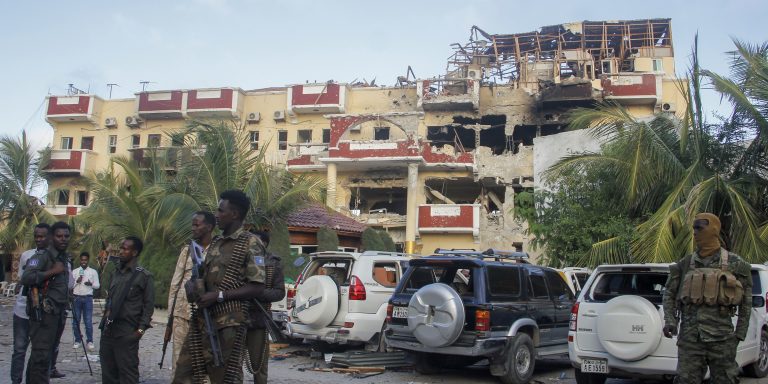INTELBRIEF
August 23, 2022
IntelBrief: Al-Shabaab Attack Demonstrates Continued Resilience in Somalia

Bottom Line Up Front
- A deadly weekend-long siege by al-Shabaab, al-Qaeda’s affiliate in Somalia, at an upscale Mogadishu hotel resulted in 21 dead and more than 100 people injured.
- Despite the airstrikes and increased U.S. troop presence in Somalia, al-Shabaab clearly remains capable of conducting high-profile terrorist attacks directly in Somalia’s capital.
- Al-Shabaab has repeatedly proven that it remains highly resilient and able to embarrass the Somali government, proving to Somalis that the government and security forces are unable to protect them.
- The challenge posed by al-Shabaab is set against the backdrop of deteriorating conditions across Somalia, highlighting that effectively countering the terrorist threat means also addressing food insecurity, severe drought, and ongoing governance challenges.
A deadly weekend-long siege at an upscale Mogadishu hotel by al-Shabaab, al-Qaeda’s affiliate in Somalia, resulted in 21 dead and more than 100 people injured. Al-Shabaab has repeatedly attacked “soft targets” throughout Somalia, frequently focusing on hotels and other areas frequented by civilians. The weekend attack at the Hayat Hotel, popular with government officials and Somali lawmakers, was the first major attack since President Hassan Sheikh Mohamud took office in May. The attack was complex and demonstrated sophistication, as a team of militants used automatic weapons and explosives during the assault. The attack was condemned by the United Nations, Turkey, Kuwait, and several other countries in its immediate aftermath. Some counterterrorism analysts highlighted the slow response from Somali security services, whose performance is likely to come under further scrutiny in the coming days and weeks.
The attack comes on the heels of an increase in U.S. airstrikes against the terrorist group, even as there appears to be a reduction in strategic counterterrorism and prevention efforts globally. In early August, U.S. Africa Command (AFRICOM) announced several airstrikes in and around Teedaan, Somalia, resulting in more than a dozen al-Shabaab fighters being killed. In May, President Biden announced the reversal of former President Trump’s decision to withdraw special operations forces from Somalia and moved to send several hundred troops back into the country, although a specific number was not provided by the Administration. Despite the airstrikes and increased U.S. troop presence in Somalia, al-Shabaab clearly remains capable of conducting high-profile terrorist attacks directly in Somalia’s capital. Al-Shabaab controls vast swaths of territory in central and southern Somalia and more recently has launched attacks along Somalia’s border with Ethiopia, raising concerns about a new offensive and whether airstrikes alone can address the challenge posed by the group, which has eluded counterterrorism efforts since the group was initially founded in 2006. Moreover, al-Shabaab can wreak havoc throughout the region, including in neighboring Kenya, where the group has expanded its recruitment and propaganda over the past decade.
Since the late July killing of al-Qaeda emir Ayman al-Zawahiri, there has been significant discussion of how his death might impact the broader global jihadist movement, but particularly how it would affect al-Qaeda’s worldwide network of affiliates. Al-Shabaab is among the most capable of these affiliates and there was some speculation that it might provide the next leader of al-Qaeda. Al-Shabaab has proven time and time again that it remains highly resilient and adaptive to counterterrorism pressure and able to embarrass the Somali government and prove to Somalis that both the government and security forces are unable to protect them. In last weekend’s attack, two massive car bombs were detonated at the front entrance to the hotel, followed by a forcible entry by al-Shabaab gunmen, some of whom took hostages on the upper floors of the hotel. Despite losing some of its top leadership, the group’s bombmaking expertise is evident. In October 2017, an al-Shabaab truck bomb killed more than 500 people when it detonated at a busy intersection in Mogadishu.
The challenge posed by al-Shabaab is set against the backdrop of deteriorating conditions across Somalia, challenges that go beyond the security realm. This includes severe drought and growing food insecurity, with the possibility that the country could soon be facing a disastrous famine. Against these conditions, al-Shabab’s role as a de facto governing body across the country has given international officials pause and prevented their designation as a terrorist group by the UN, as Security Council members fear disruption to the sorely needed humanitarian assistance. However, as U.S. efforts demonstrate, this does not impede bilateral sanctions or actions against the group. Somalia has been struggling with conflict on and off for decades, as governance deficits and endemic corruption have plagued state-building efforts. The Biden administration’s decision to send elite commandos back to Somalia will likely help in the fight against al-Shabaab, but even this is a tactical advantage, which will do little to impact the strategic outlook of the country. As global attention shifts away from counterterrorism and prevention and focuses on more traditional geopolitics and (current and potential) inter-state conflicts, a country like Somalia could easily fall off the radar, plunging back into civil war and famine until the situation reaches a crisis point too existential to ignore. That has been the cycle for the past four decades, external actors applying a salve without ever coming together to develop a comprehensive diagnosis or response to the long-term needs of the country and its people.